
Queensland Academy of Sport and Other Sports Organisations
The Queensland Academy of Sport (QAS) is an initiative of the Queensland Government aimed at supporting the State's elite and identified developing athletes, with the goal of ensuring Queensland remains at the forefront of domestic and international sport. QAS now supports more than 600 athletes across 22 different sports and individual scholarship places. The QAS headquarters include sports training, research, laboratory, medical, and allied health facilities, as well as the first state-based Sport Performance Innovation and Knowledge Excellence (SPIKE) of its kind in Australia.
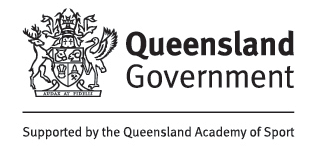
Over the years, the ACEMS-QAS collaboration has strengthened and extended to additional partners including the Australian Institute of Sport (AIS) and many other sporting bodies.
In 2021, important developments have included:
- Commencement of a three-year strategic partnership, that will continue ACEMS research through a collaboration between QUT Centre for Data Science, QAS and AIS.
- Completion of an industry co-funded cross-node project with QAS, AIS and other sporting bodies.
- Research outputs including journal articles, working papers and two vacation research student projects completed.
- The Sports Systems Domain launch by the QUT Centre for Data Science with support from industry and members across all ACEMS Nodes.
- ACEMS CI Kerrie Mengersen featured as a keynote speaker at AIS’s STARS conference.
- QAS attending ACEMS final Meet-and-Greet to celebrate the collaboration and future opportunities such as the Brisbane 2032 Olympics.
QUT-QAS-AIS Strategic Multi-Year Partnership (2021-2024)
This partnership will help the QAS achieve its ambition of inspiring extraordinary sporting success by enabling high-performance sport to collect, interpret and leverage data intelligence for a data-driven competitive advantage.
Jeff Greenhill, Manager – Sport Performance Innovation & Knowledge Excellence (SPIKE) hub Queensland Academy of Sports (QAS)
ACEMS has supported a range of projects with QAS, AIS and other sporting organisations, and so it is pleasing to see this collaboration will continue beyond ACEMS with a strategic formal partnership between QUT, the Australian Institute of Sport and the Queensland Academy of Sport, until 2024.
The new deal, worth more than half a million dollars, brings together top experts from ACEMS with industry to:
- Tackle key challenges and support day-to-day decisions in sports and fitness.
- Help foster new innovations at the intersection of data science, and the sports, exercise, sport science and sport medicine.
- Provide a sports data science toolbox contributes to data collection, data exploration, visualisation and modelling and analysis and decision support.
- Develop methods for risk informed decisions to support athletes’ training, fatigue, injury, and performance.
- Support industry collaborators QAS and AIS continue their pursuits as innovative leaders in high-performance sport solutions.
- Help determine “what’s needed to win” to help our athletes succeed - and prepare for Olympics events including Australia’s own Brisbane Olympics 2032.
A key research area for this project aims to better understand the need to balance potential performance gains against athlete fatigue to so athletes, trainers and coaches can ensure peak performance. As well as better training regimes, this project will help determine what is needed to win, by harnessing performance data including trajectory analysis of world records and individual careers, characterisation of the competition, depth charts, trends, and breakout performance predictions.
ACEMS AI Paul Wu is the Postdoctoral Researcher Appointed to this Partnership
This unique opportunity brings together researchers, practitioners and end-users in sports such as swimming, triathlon, and Australian football. The partnership will help build an understanding, analysis and predictive models of athlete injury risk, training and fatigue, performance in a whole-of-systems model over time.
What makes this project so exciting is the growing availability of comprehensive data across the many dimensions of an athlete’s health, training and performance.
Working with industry partners will ensure collaborative development and uptake of new insight that can benefit elite athletes, with a view to benefitting the wider community in the future.
It is particularly thrilling to be a part of a project like this as Brisbane will host the 2032 Olympics. A key part of the analysis would be to try to determine “what it takes to win”.
Dr Paul Wu, ACEMS Associate Investigor
During his time as an ACEMS AI, Paul Wu has helped establish a strong relationship with Australia’s elite sports organisations and delivered research outcomes which have been credited as helping Australia win medals in sports such as swimming. As the industry research fellow on this project, Paul will lead three PhD Student projects as part of the partnership.
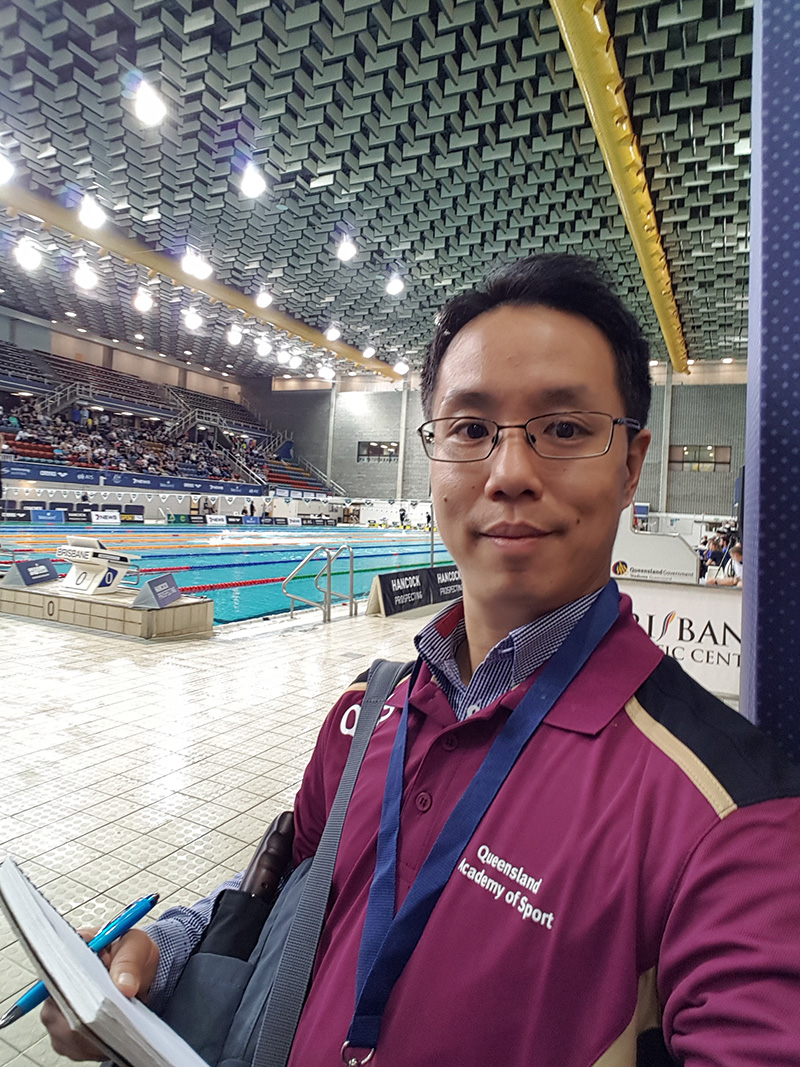
New Industry-Academia Research Opportunities for Research Students
Background:
- With elite sports becoming more competitive, coaches, athletes and sports scientists are looking to use data to maximise training outcomes for greater competitive performance.
- Buoyed by the proliferation of new technologies including wearables and video analytics, data can now be collected at higher levels of precision and frequency across a broader range of categories than ever before.
- However, making sense of this “big data” to optimise training outcomes and competitive performance has emerged as a key challenge.
Research activities:
- A series of projects are being offered towards the development of new statistical and machine learning tools in cross-disciplinary collaboration with sports scientists and coaches/athletes.
- Methodological areas revolve around the development and application of modern Bayesian approaches for modelling complex dynamic systems. Bayesian inference provides a systematic and rigorous approach for prediction and estimation of real world problems under uncertainty.
- The projects involve: ACEMS, QUT Centre for Data Science, Queensland Academy of Sport, Australian Institute of Sport, sports organisations and teams.
Research areas and opportunities include:
- Efficient computation, inference and learning of state space models (Dynamic Bayesian Networks) for possibly non-homogeneous systems. This can include the human body in the context of adapting to training and the susceptibility for injury.Learning and inference with such models whilst incorporating highly heterogeneous data collected at potentially different frequencies and scales is challenging. This data includes performance, training, and injury data. This can be linked to many other influential factors including physiological, psychological, nutrition and sleep.
- Learning and inference of models with intractable likelihoods in sports. There are many problems in sports where it's impractical or infeasible to formulate a likelihood. This might arise due to complex interactions between players in a game or complex physiological-psychological-environmental processes.
- Simulation models, such as Agent Based Modelling (ABM), could be used to simulate potential scenarios (e.g. athletes racing in a triathlon, plays being run in basketball) but estimation of ABM parameters are challenging. One potential solution is the use of approaches that combine simulation with Bayesian inference (e.g. Approximate Bayesian Computation).
Cross-Node Industry Collaboration Support Scheme Project
A new collaborative ACEMS-Industry co-funded research project entitled “Developing Bayesian methods for modelling the dynamics of complex systems in sports: performance vs injuries” was completed in 2021, involving ACEMS (QUT & UNSW) and Industry partners QAS, AIS, and sporting bodies Triathlon Australia (TA) and the West Coast Eagles (WCE).
Extracts from Letters of Support from Queensland Academy of Sport and Triathlon Australia of the New Collaborative Research Project Supported by ACEMS and Industry: “Developing Bayesian methods for modelling the dynamics of complex systems in sports: performance vs injuries”
We consider the proposed research to be innovative and believe the expected outcomes will deliver significant impact to our organisation. …These projects both offer great possibility from a performance perspective, further educating our staff and building on our organisational knowledge. In the short term, it is anticipated that the outcomes may positively influence preparations for the 2021 Tokyo Olympic Games. In the long term, integrating data science methods may also help address other challenges faced by sports programs, adding a new component to the current problem-solving methodology.
Queensland Academy of Sports
Triathlon Australia’s interest in engaging in innovative collaborative research with ACEMS, and other peak sports bodies in Australia, is to guide and support data science research in the sport of triathlon, improve data-driven decision making, and deliver sustained practical impact, to benefit our High-Performance team and the athletes they support and deliver services to. We believe this research can positively contribute to athlete health, optimising training load, coaching practices, strategy and tactics, athlete pathways, and talent identification. It will also afford the opportunity to share knowledge across research and sports, by bringing together research statisticians and data scientists with personnel including sports scientists, analysts, data scientists, coaches, and managers at Triathlon Australia, as well as the Queensland Academy of Sport (QAS) and Australian Institute of Sport (AIS).
Justin Drew, National Performance Director, Triathlon Australia
The Bayesian sports data science project involved the use of challenging data that are diverse and heterogeneous in terms of their scope and how they are collected, and used to help inform decisions to assist coaches, athletes, and sports scientists in their preparation for competition, including the Olympics.
This project aimed to tackle two critical and interrelated factors in performance and injury risk, which underpin training in athletes, and are key to fitness in the general population. The research work involved ACEMS AI Paul Wu and CI Kerrie Mengersen from QUT, AI Clara Grazian and CI Scott Sisson from UNSW, as well as sports scientists / epidemiologists at the AIS, QAS, Triathlons Australia and West Coast Eagles. Their research work included:
- A literature review of methods currently used for injury modelling, and methods from other fields that could be applied to this task.
- Developing a simulation model of triathlon performance, and pilot methods that could address some of the challenges of dynamic and non-homogeneous risks with methods that are novel to the sports injury field.
- Building a critical mass of researchers in statistical data science, sports, and physiology, to benefit the elite sporting community and ultimately the health and fitness of the general public.
The team’s research findings have subsequently been published in PLoSOne and further journal articles are expected to be published soon – further details in the section below. This work has also laid the foundations to support future grant applications, PhD projects and collaborations with other sporting bodies in this research area. In addition to future academic work, this research has seen immediate application with the West Coast Eagles football team to better inform their training decisions.
Research outputs and Vacation Research Student engagement
ACEMS work with its research partners has produced several journal articles (one published; four submitted and under review) and created two Vacation Research Student projects that commenced in December 2021. These research outputs and projects will benefit other researchers in the sport-domain and attract HDR student talent to work on future projects.
Publications and Submitted Journal Articles
Wu, P. P.-Y. et al. (2021) Predicting performance in 4 x 200-m freestyle swimming relay events. PloS one. [Online] 16 (7), e0254538–e0254538.
“Understanding the relationship between pre- and post-return-to-play workloads and subsequent injury: a Bayesian survival model approach”, Journal of Sports Science Under review. Jordan Stares, Jack Fahey-Gilmour, Mick Drew, Liam Toohey, Paul Wu et al.
“A multidisciplinary review of potential methods for modelling subsequent sports injuries.” PLOS One. Under review. Yu Yi Yu, Paul Wu, Liam Toohey, Mick Drew, James Gilmore, Scott Sisson, Clara Grazian, Kerrie Mengersen.
Journal article on Bayesian survival modelling with time-varying covariates (submitted and under review).
Journal review article of subsequent event modelling (submitted and under review).
Researcher: Andres Gomez
Supervisor: Paul Wu
ABSTRACT:
Nowadays in most sports, there are technologies that have allowed the collection of vast quantities of data with many purposes. Perhaps one of the most important purposes is to gain insight into the performances of the athletes. Having this data available for analysis has brought many challenges to sporting coaches and managers. One of those complications is that sometimes it is difficult to analyse data due to the large number of data points available.
Here, the aim is to provide a better mathematical description of discrete data (DD) that are samples from an underlying continuous process. This can simplify the data analysis and give a starting point for the understanding of patterns in the data and its visualisation. The method we have used are Functional Data Analysis (FDA) and Functional Principal Component Analysis (fPCA). We investigate three different methods to go from DD to functional data (FD): Splines smoothing, Trigonometric polynomial smoothing, and Radial Basis Functions smoothing. A Matlab function was developed for each of these methods. For obtaining fPC’s, a Matlab script was written, and Singular Value Decomposition function was used. We first apply our methods to a test dataset of Canadian weather observations, before considering data provided by Paddle Australia on the performances of some of their athletes. The results show that, via FDA the data dimensions were reduced from several thousand of data points to a set of function parameters that represent the data. Besides, the fPCA allowed us to visualise relationship among the variables measured in a clearer way. This allows us to identify potential differences between athletes, and between performances. Also, fPCA allowed to overcome the multidimensional problem for plotting. FDA provides a powerful tool for the analysis of sport performance data, and any data that can be considered coming from an underlying continuous process.
PROJECT: Predicting Player Performance in Cricket
Researcher: Alex Kenna
Supervisor: Chris Drovandi
ABSTRACT:
Effective player selection is critical for team performance in cricket. This is especially true at the international level, where the best players are selected to represent their nation, largely based on their perceived potential. However, without an accurate method for predicting the performance of batters, selections are often made based on traditional metrics deemed important with little empirical evidence, such as domestic batting averages. This project aims to develop a method for predicting batter performance at the international level based on their domestic careers. In doing so, we will identify and quantify the most important metrics for determining international success. This is achieved through the derivation of a Random Forest model that uses domestic data to predict the batting average of a player in One Day International cricket. The model is fitted based on a subset of domestic metrics determined to be most important through feature selection techniques including recursive feature elimination and clustering. This enables the development of a model that is explainable, efficient, and accurate. Experimentally, the results support the idea that player performance is largely determined by the traditional metrics currently used for player selection. They also provide insight into lesser-known metrics, such as which domestic formats produce better international batsmen and how a batter’s contribution to their team translates to international performance. These results allow us to identify the features of a batter’s domestic career that have the most significant influence on international performance. This has practical implications in team selection, talent identification and player comparison.
QUT Centre for Data Science Sports Domain Launch
QUT Centre for Data Science officially launched a Sports System Domain with a showcase event in November 2021.
Launch of Sports Domain at ACEMS QUT with External Collaborators
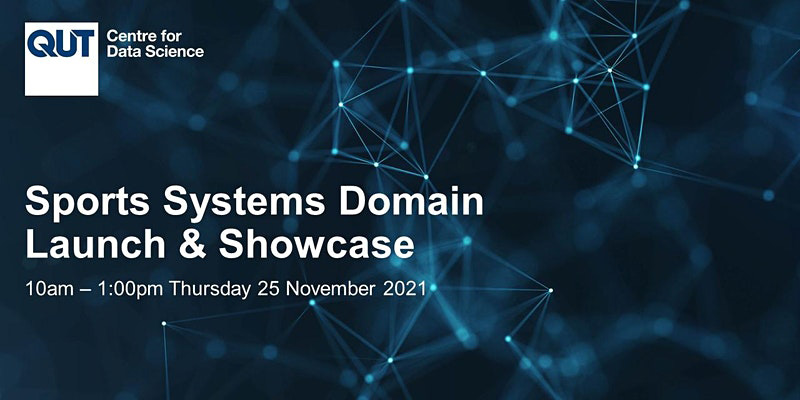
QUT Centre for Data Science Sports Systems Domain
"Our vision is to tackle key challenges and support day-to-day decisions in sports and fitness through innovations at the intersection of data science, and the sports, exercise and physiological, and psychological sciences.”
The launch featured a showcase of work by ACEMS, Industry partners including the AIS and QAS plus by researchers from other disciplines, as well as workshops on collaborating, funding, and a national initiative.
The QUT Sports System Domain is co-led by ACEMS AIs Paul Wu and Simon Denman and includes ACEMS members from QUT and UNSW across multiple research disciplines. The domain also engages with industry, including AIS, QLD Health, Jamieson Trauma Institute, and others.

Academic and industry attendees at the Sports Domain launch at QUT
Australian Institute of Sport STARS Conference Keynote
The Australian Institute of Sport (AIS) hosts an annual Sports Technology and Applied Research Symposium [STARS], bringing together sport and exercise researchers, technologists, and high performance network personnel from across Australia to share ideas that can drive innovation in their fields. In 2021, the symposium theme was ‘Trajectory 2032’ - inspired by the Brisbane Olympics 2032.
ACEMS QUT’s Kerrie Mengersen was a keynote guest at STARS, presenting on the topic “Trajectory 2032: Is the time right for a National Sport Data Analytics Hub?”
Abstract: “The demand from high performance sport to generate data in the field, rather than in the laboratory, has led to the development and deployment of more and more technology to collect data. Vast amounts of data from wearable sensors, instrumented equipment, and the increasing use of computer vision to extract more granular information from video, the competitive nature of high performance sport has seen an explosion in the amount of data that can be collected. However, there are compelling questions as to whether our capabilities to analyse and action data has kept pace with technology hardware development? In this presentation, Professor Kerrie Mengersen from QUT’s Centre for Data Science will provide STARS participants with examples of how other industries are organising themselves and reaping the benefits of greater insights from data. As our national high performance sport system heads toward 2032, the question arises: ‘Is the time right for a National Sport Data Analytics Hub’?
ACEMS Meet-and-Greet Event for Local Industry
Queensland Academy of Sport collaborators, with Queensland Department of Tourism, Innovation and Sports, were industry guests at ACEMS November Meet-and-Greet event. The event celebrated and reflected upon the successes of the QAS-AIS-ACEMS partnership and explored future research opportunities such as the Brisbane Olympics 2032 for existing collaborators, students, and other industry stakeholders.
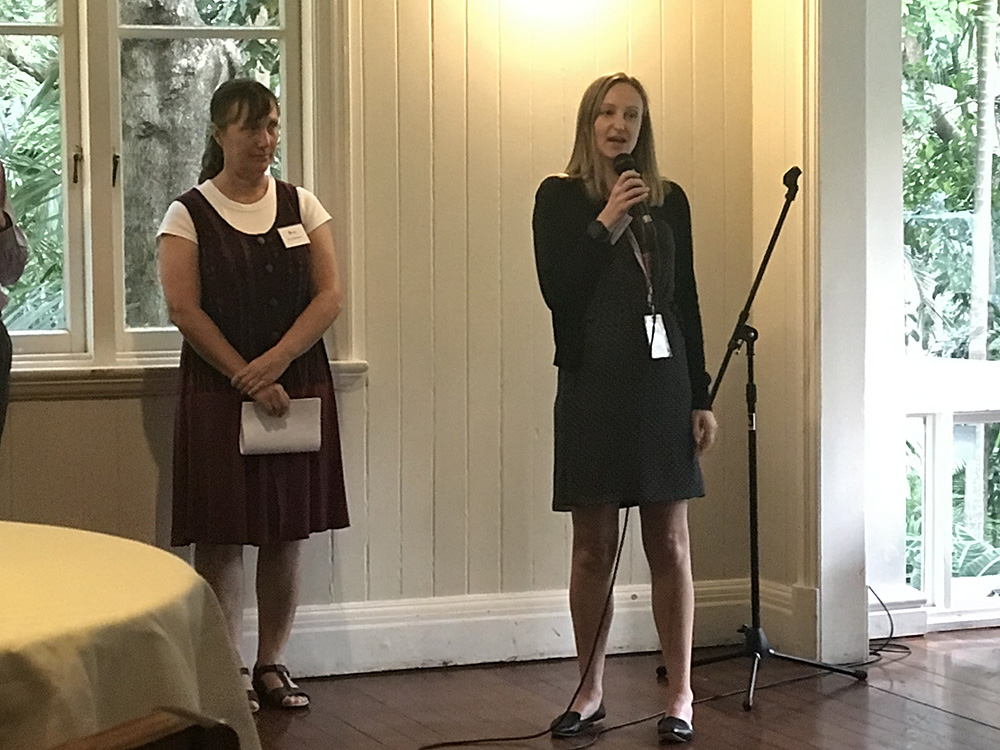
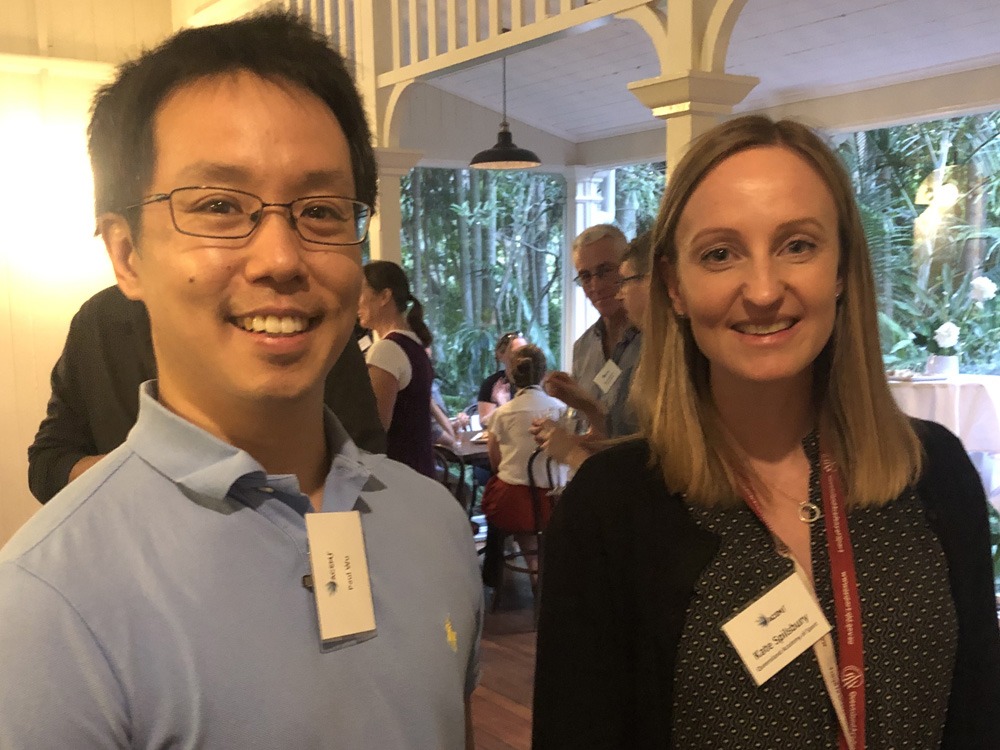
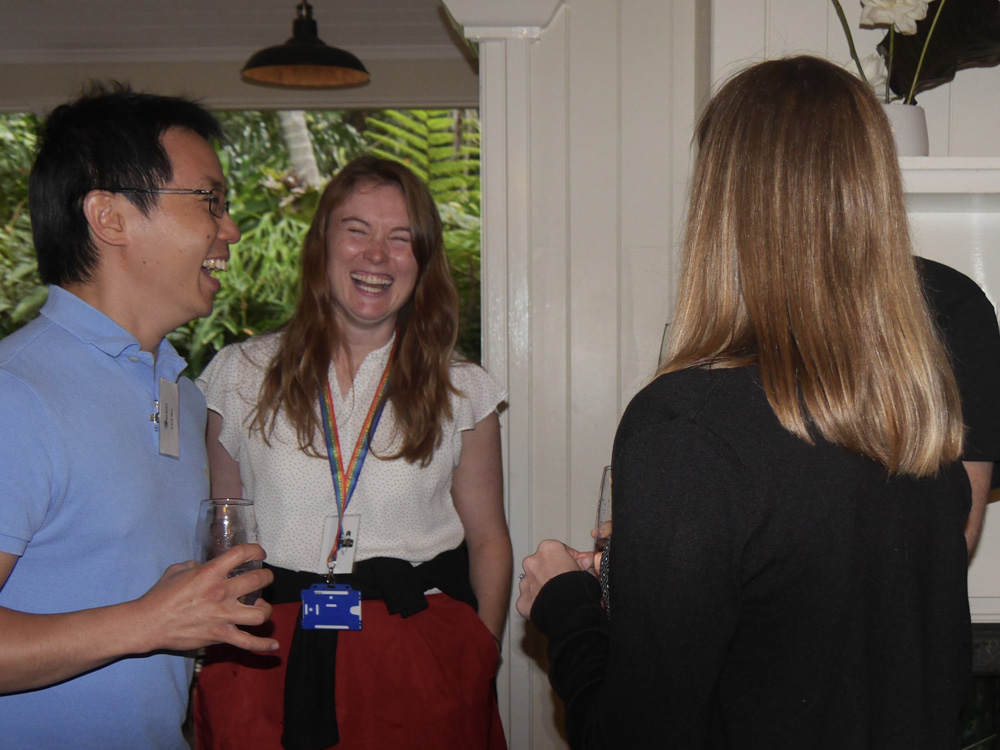
Industry guests including Kate Spilsbury (Queensland Department of Tourism, Innovation and Sport / Queensland Academy of Sport) and ACEMS members, including QAS collaborator Paul Wu, at the Centre’s Meet-and-Greet event in November.